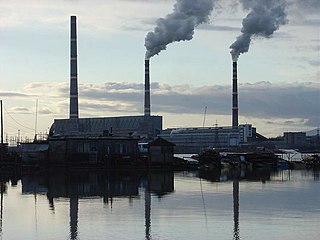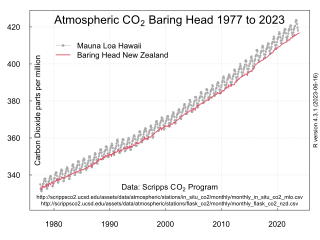Related Research Articles

Emissions trading is a market-oriented approach to controlling pollution by providing economic incentives for reducing the emissions of pollutants. The concept is also known as cap and trade (CAT) or emissions trading scheme (ETS). One prominent example is carbon emission trading for CO2 and other greenhouse gases which is a tool for climate change mitigation. Other schemes include sulfur dioxide and other pollutants.

Environmental economics is a sub-field of economics concerned with environmental issues. It has become a widely studied subject due to growing environmental concerns in the twenty-first century. Environmental economics "undertakes theoretical or empirical studies of the economic effects of national or local environmental policies around the world. ... Particular issues include the costs and benefits of alternative environmental policies to deal with air pollution, water quality, toxic substances, solid waste, and global warming."
Environmental finance is a field within finance that employs market-based environmental policy instruments to improve the ecological impact of investment strategies. The primary objective of environmental finance is to regress the negative impacts of climate change through pricing and trading schemes. The field of environmental finance was established in response to the poor management of economic crises by government bodies globally. Environmental finance aims to reallocate a businesses resources to improve the sustainability of investments whilst also retaining profit margins.

A carbon tax is a tax levied on the carbon emissions from producing goods and services. Carbon taxes are intended to make visible the hidden social costs of carbon emissions. They are designed to reduce greenhouse gas emissions by essentially increasing the price of fossil fuels. This both decreases demand for goods and services that produce high emissions and incentivizes making them less carbon-intensive. When a fossil fuel such as coal, petroleum, or natural gas is burned, most or all of its carbon is converted to CO2. Greenhouse gas emissions cause climate change. This negative externality can be reduced by taxing carbon content at any point in the product cycle.

Roger Lawrence Kerr, a public policy and business leader, was the executive director of the New Zealand Business Roundtable, a free-market think-tank based in Wellington, New Zealand.
The Ministry for the Environment is the public service department of New Zealand charged with advising the New Zealand Government on policies and issues affecting the environment, in addition to the relevant environmental laws and standards. The Environment Act 1986 is the statute that establishes the Ministry.

Resources for the Future (RFF) is an American nonprofit organization, founded in 1952, that conducts independent research into environmental, energy, and natural resource issues, primarily via economics and other social sciences. Headquartered in Washington, D.C., RFF performs research around the world.
The Stern Review on the Economics of Climate Change is a 700-page report released for the Government of the United Kingdom on 30 October 2006 by economist Nicholas Stern, chair of the Grantham Research Institute on Climate Change and the Environment at the London School of Economics (LSE) and also chair of the Centre for Climate Change Economics and Policy (CCCEP) at Leeds University and LSE. The report discusses the effect of global warming on the world economy. Although not the first economic report on climate change, it is significant as the largest and most widely known and discussed report of its kind.

Carbon pricing is a method for governments to mitigate climate change, in which a monetary cost is applied to greenhouse gas emissions. This is done to encourage polluters to reduce fossil fuel combustion, the main driver of climate change. A carbon price usually takes the form of a carbon tax, or an emissions trading scheme (ETS) that requires firms to purchase allowances to emit. The method is widely agreed to be an efficient policy for reducing greenhouse gas emissions. Carbon pricing seeks to address the economic problem that emissions of CO2 and other greenhouse gases are a negative externality – a detrimental product that is not charged for by any market.

Carbon emission trading (also called carbon market, emission trading scheme (ETS) or cap and trade) is a type of emissions trading scheme designed for carbon dioxide (CO2) and other greenhouse gases (GHGs). A form of carbon pricing, its purpose is to limit climate change by creating a market with limited allowances for emissions. Carbon emissions trading is a common method that countries use to attempt to meet their pledges under the Paris Agreement, with schemes operational in China, the European Union, and other countries.

Climate change in New Zealand involves historical, current and future changes in the climate of New Zealand; and New Zealand's contribution and response to global climate change. Summers are becoming longer and hotter, and some glaciers have melted completely and others have shrunk. In 2021, the Ministry for the Environment estimated that New Zealand's gross emissions were 0.17% of the world's total gross greenhouse gas emissions. However, on a per capita basis, New Zealand is a significant emitter, the sixth highest within the Annex I countries, whereas on absolute gross emissions New Zealand is ranked as the 24th highest emitter.
The Asia-Pacific Emissions Trading Forum (AETF) was an information service and business network dealing with domestic and international developments in emissions trading policy in Australia and the Asia-Pacific region. The AETF was originally called the Australasian Emissions Trading Forum, and was founded in 1998 under the auspices of the Sydney Futures Exchange following a proposal from Beck Consulting Services. From 2001 until 2011 the AETF published the AETF Review, held regular member meetings and convened numerous events and conferences. The AETF Review was published six times per year and included original articles on emissions trading developments and related topics.

The New Zealand Emissions Trading Scheme is an all-gases partial-coverage uncapped domestic emissions trading scheme that features price floors, forestry offsetting, free allocation and auctioning of emissions units.
The Climate Change Response Amendment Act 2008 was a statute enacted in September 2008 by the Fifth Labour Government of New Zealand that established the first version of the New Zealand Emissions Trading Scheme, a national all-sectors all-greenhouse gases uncapped and highly internationally linked emissions trading scheme. After the New Zealand general election, 2008, the incoming National-led government announced that a Parliamentary committee would review the New Zealand emissions trading scheme and recommend changes. Significant amendments were enacted in November 2009. Obligations for pastoral agriculture were further delayed. Obligations for energy and industry were halved via a "two for one" deal. Free allocation of units to industry was made uncapped and output based and with a slower phase-out. A price cap of $25 NZD per tonne was introduced.
Motu Economic and Public Policy Research is an economic and public policy research institute based in Wellington, New Zealand.

Sir Dieter Robin Helm is a British economist and academic.
Nathaniel O. Keohane is an American environmental economist who serves as president at the Center for Climate and Energy Solutions (C2ES).

Gernot Wagner is an Austro-American climate economist at Columbia Business School, where he is a tenured full professor. He holds an AB and a PhD in political economy and government from Harvard University, as well as an MA in economics from Stanford University. A founding co-director of Harvard's Solar Geoengineering Research Program (2017-2019) he joined the faculty of New York University in 2019, moving to Columbia University in 2022. Wagner writes a monthly column for Project Syndicate, and is the co-author, with Martin L. Weitzman, of Climate Shock, a Top 15 Financial Times-McKinsey Business Book of the Year 2015. He won the "Austrian of the Year" award in 2022, awarded by Austrian daily Die Presse.
The Interim Climate Change Committee is a ministerial advisory committee created by the New Zealand Government in mid–April 2018 to explore how New Zealand transitions to a net zero emissions economy by 2050. The Interim Committee was superseded and replaced by an independent Climate Change Commission under the Climate Change Response Amendment Act in November 2019.

Richard G. Newell is an American energy economist, environmental economist, and climate policy expert who served as the seventh administrator of the United States Energy Information Administration from 2009 to 2011. He is currently the president and CEO of Resources for the Future, a nonprofit environmental economics research and policy institute in Washington, D.C. He has previously served as Senior Economist for Energy and Environment on the President's Council of Economic Advisers and as Professor of Energy and Environmental Economics at Duke University.
References
- ↑ "Suzi Kerr | School of Government | Victoria University of Wellington". Victoria.ac.nz. Retrieved 3 July 2017.
- ↑ "From global climate change policy to the New Zealand farm". interest.co.nz. 5 September 2015. Retrieved 3 July 2017.
- ↑ Eric Frykberg (25 August 2015). "ETS not lucrative for industry, says economist | Radio New Zealand News". Radionz.co.nz. Retrieved 3 July 2017.
- ↑ "Thinktank Motu puts forward new plan to tackle emissions trading". Stuff.co.nz. 31 May 2017. Retrieved 3 July 2017.
- ↑ "Wanaka's Aspiring Conversations programme launched". Stuff. 17 February 2016. Retrieved 3 February 2018.
- ↑ Shaw, James (17 April 2018). "Interim Climate Change Committee announced" (Press release).